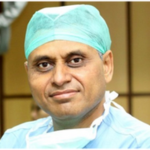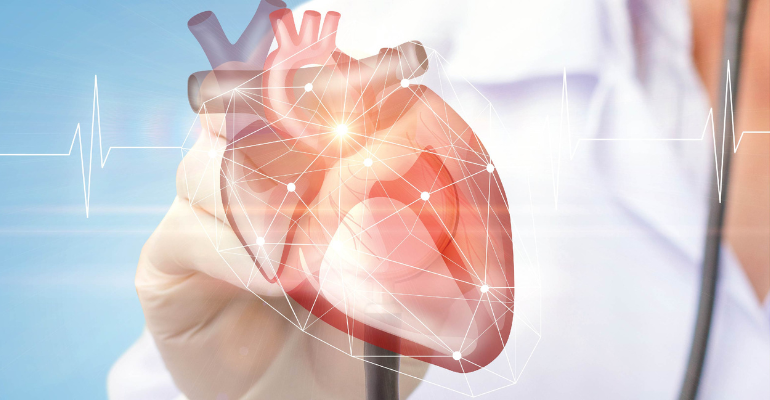Yeh Dil Maange More- A Guide to Healthy Heart
Dr. Rajiv Agarwal, MD, DM, FACC
Senior Director Cardiology,
Max Smart Superspeciality Hospital,
New Delhi

In today's world, everyone knows someone who suffered a sudden heart attack. Heart disease is truly the most dreaded health problem in modern life even in healthy people living a reasonably healthy life. Is heart disease an unpredictable event that can happen to you at any time, or can you identify your risk factors and take preventative measures?
A healthy lifestyle may prevent 80% of early heart disease, stroke, and diabetes, according to a 2010 World Health Organisation report. According to a British research termed the Whitehall study, which had 19,000 healthy office workers, people who led a healthy lifestyle and maintained normal blood pressure, blood sugar, and weight lived an average of one decade longer than people who didn't. Thus, it should go without saying that we ought to be aware of our heart's condition and how to take better care of it. Both "years to our life" and "life to our years" will be added by this. Put another way, extend not only your life but also your health. We present a simple scheme showing you how this is possible. It is based on an initiative by the American Heart Association called Life’s Essential Eight, but it is equally applicable to Indians.
What is Life’s Essential Eight?
Life’s Essential Eight lists 8 simple questions that you should be able to answer about your lifestyle and health status and can be rated as 0, 1, or 2 points. So the healthiest people will score 10-16 points, average 5-9 points, and unhealthy 0-4 points. This simple 2-minute test will predict your risk of developing heart attack, stroke, heart failure, cancer, and even depression besides your life expectancy. Better than going to the Jyotishi I would say. It consists of four health-related behaviors – smoking and tobacco, a healthy diet, adequate exercise, and getting adequate good quality sleep. Add to this 4 things that you have to measure – blood pressure, blood sugar, serum cholesterol, and body weight.
Stay Active :- Exercise and Fitness Strengthen your body and mind and reduce your risk of Cardiovascular Problems. Find the right exercise and activity for you what you like and can do 12 times a month, Only talk to your doctor if You start. 2 points for moderate activity for 150 minutes or 75 minutes of vigorous activity per week. 1 point less activity 0 points for No Activity
Healthy Eating :- The healthy diet topic is becoming controversial these days. However, you should Eat less salt and sugar, eat a healthy, balanced diet, avoid fast food, and eat plenty of fruits and vegetables. Fat intake Okay, but watch the calories. Non-vegetarian productsfocus on white meat and eggs. Milk and dairy products are an important source of protein in the Indian diet
BMI monitoring :- Calculate your body mass index (BMI). This is an approximation of your body fat content, and a better guide than weight. Very simple to calculate by dividing your weight (kg) by the square of your height. Height in meters. For Indians, BMI should be less than 23 (2 points). BMI > 23-28 is 1 point.
Blood pressure :- The higher your blood pressure, so as the risk of heart and vein damage (i.e. high blood pressure). Normal BP is 120/80 without treatment (2 points) Score 0 points if BP is >140 upper or > 90 lower value ,With or without treatment. For intermediate or even for normal values with treatment can be given 1 point
Blood Cholesterol :- There are 2 types of cholesterol: low-density lipoprotein (LDL) and high-density lipoprotein. Although cholesterol is unhealthy, it is necessary for the proper functioning of the body. High levels of LDL cholesterol can clog arteries. Score 2 points for total cholesterol <200 mg /dl, 1 point for 200-240 mg /dl 0 points for higher values
Blood Sugar :- Knowing your blood sugar levels is just as important as knowing your blood pressure and cholesterol levels. While it can be controlled with diet and exercise, diabetes usually requires medication. Even pre-diabetes increases your risk of heart disease If you don't fast, your glycosylated hemoglobin is a measurement that reflects your average blood sugar levels over 3 months FPG (Fasting plasma glucose ) <100 mg/dl or HbA1c <5.7% is ideal and scores 2 points FPG 100-120 or HbA1c 5.8-6.4 will be given 1 point FPG >120 or HbA1C> 6.5 increases risk – 0 points
Tobacco use :- Smoking or using tobacco by mouth is harmful to almost everyone.The chemicals in tobacco harm the structure and function of blood vessels and hurt your heart. This also applies e- cigarettes advertised today.
2 points if you don't smoke or have never smoked(never or quit for 12 months or more)
1 point if you quit less than 12 months ago
0 points if you are a current user
According to studies, persons between the ages of 45 and 64 have an overall lifetime risk of only 14.4% for those who fit into the optimal category, 26.8% for those who fall into the average category, and a startling 48.6% for those who fall into the insufficient category.
Use this as a ballpark estimate of your cardiac health and as motivation to get healthier. Keep in mind that you are ultimately responsible for your health and that you can all take many steps to improve it. This holds for individuals who already have a medical condition. On the path to optimal health, the physician can serve as a guide and ally.
So let’s take a few simple steps or simple goals every week for a healthy heart and most importantly, follow them regularly. Occasional indulgences are permitted provided we take care of the big picture.
Today's demand for a Healthy Heartis “Yeh Dil Maange More”







